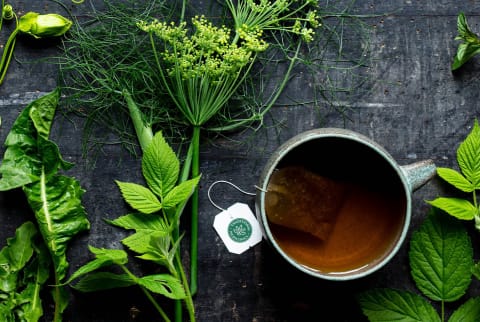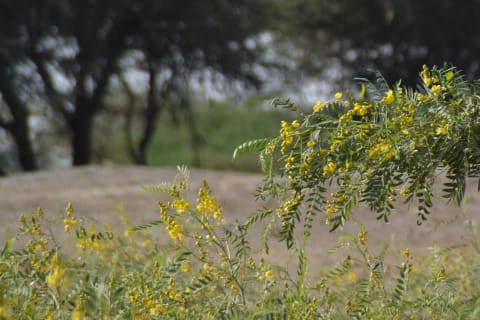Advertisement
Curious About Herbalism? Here's How You Can Harness The Power Of Plants

Well-being isn't just about healthy eating or hitting the gym. It's about making choices that better our health in greater harmony with the planet. But over the last 200 years, we have become increasingly disconnected from nature.
"This has led to mistreatment of the planet along with physical, mental, and emotional challenges in humans," Taryn Forrelli, naturopathic doctor and chief science officer at Traditional Medicinals®, told mindbodygreen. But luckily, there is a shift happening: People are finally turning back to the ancient plant wisdom passed down from our ancestors.
According to Forrelli, ancient plant wisdom is a body of knowledge that includes "the ways of using plants medicinally as well as methods of identifying, sustainably wild-harvesting, and preparing them in ways that ensure their quality and optimize their benefits."
Traditional Medicinals—a botanical wellness B Corp and leading medicinal tea brand in the U.S.—embodies that approach. They have a team of renowned herbalists, naturopaths, ethnobotanists, plant chemists, and sourcing experts on staff to guide the entire process behind their line of teas, lozenges, and capsules. It's an art and a science.
Food is medicine
The idea that food is medicine is nothing new. But "food" doesn't just refer to fruits and veggies. "Everything we put into our bodies is information for our cells, systems, and microbiome," Forrelli explained. "Exposure to a variety of phytonutrients—the bioactive compounds produced by plants—contributes to greater microbiome diversity, ultimately enhancing overall wellness, but most people's diets are severely lacking in diversity."
Not only does 50% of the world's daily caloric intake1 come from cereal grain consumption (i.e., rice, wheat, corn), but also the fruits and veggies available at the grocery store are not as phytonutrient-dense as the wild, edible plants our ancestors ate. "Consumption of medicinal plants, commonly referred to more simply as herbs, can help increase our exposure to a diverse range of plant chemistries, supporting our vitality, immune health, and resilience to stress," Forrelli noted.
"Herbs like lemon balm, ashwagandha, and others can soothe the nervous system when used regularly as part of a self-care routine. Others can be used for more acute needs such as ginger or peppermint for supporting digestion or valerian and passionflower to encourage sleep, or senna in our Smooth Move® products (our No. 1 product to help you go No. 2)."*
Not all plants have medicinal benefits or are pleasing enough to the senses to be consumed as food. Herbalists know which plants have medicinal value and rely on things like teas, tinctures, and powders to deliver the benefits. Additionally, they will often combine medicinal herbs with complementary actions into a formula for increased benefit.
Prioritizing quality
In order to effectively harness the power of plants, quality is key. That's one way Traditional Medicinals stands out in the industry.
The brand seeks out high-quality certified organic plants (including organic, wild-collected plants) to ensure sustainable growing and sourcing practices that promote soil health, biodiversity, and protect the environment—excluding synthetic fertilizers, pesticides, and other pollutants. And while quality standards vary across herbs—whether it's high essential oil content, the right amount of bitterness, or a minimum level of an active compound—Traditional Medicinals meets them all.
Not to mention, they do so ethically. Traditional Medicinals emphasizes rigorous research and testing processes to ensure efficacy and safety. But they also work to support their source communities and partners through local investments, responsible sourcing, agronomy support, ensuring living wages, elevating female farmers, and more.

Regenerating nature
Implementing herbs into our daily routine is an amazing way to connect to the source—but it's a two-way street. That means taking care of Mother Earth just as she takes care of us.
We live in an age when it's more important than ever to seek out brands that rely on sustainable practices such as ethical wild harvesting, organic farming, and monitoring climate impact while reducing greenhouse gas emissions. "This conscientious approach reinforces a connection to the planet by promoting environmental stewardship and harmonious coexistence with nature," explained Forrelli.
"By prioritizing sustainability and organic, fair practices in our supply chain, Traditional Medicinals strives to set a positive example within the industry and contribute to an environmentally and socially conscious approach to herbalism that promotes both the health of people and the health of the planet."
How to get started
If you're looking to dip your toes into the world of herbalism, Forrelli recommends checking out Traditional Medicinals' Plant Power Journal and Herb Library on their website. "These informational platforms provide a wealth of educational content, including articles, guides, tips on herbalism, and a glossary of top herbs used as plant medicine," she told us.
This serves as a great starting point, but Forrelli also suggests relying on the senses and tuning into how specific herbs make you feel when consuming them. "This helps build our intuitive knowledge of how different herbs impact our bodies."
The best part is, there are myriad herbs available for various health benefits. For example, if you don't like the warming effects of ginger tea for digestive support, you can always try a cooling peppermint or a soothing licorice.* Traditional Medicinals has over 60 teas, lozenges, and capsules to choose from. When you find your herbal allies, together you can restore balance and well-being.

Your Grandma's Go-To Supplement Is Once Again Popular (For A Good Reason)
Molly Knudsen, M.S., RDN

This Type Of Fat Is Vital For Women's Health — Are You Getting Enough?
Molly Knudsen, M.S., RDN

New Study Confirms The 3 Habits That Age Your Brain Faster
Molly Knudsen, M.S., RDN

Your Grandma's Go-To Supplement Is Once Again Popular (For A Good Reason)
Molly Knudsen, M.S., RDN

This Type Of Fat Is Vital For Women's Health — Are You Getting Enough?
Molly Knudsen, M.S., RDN

New Study Confirms The 3 Habits That Age Your Brain Faster
Molly Knudsen, M.S., RDN












